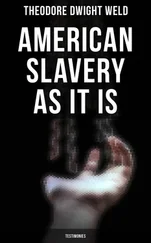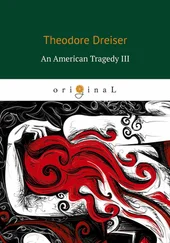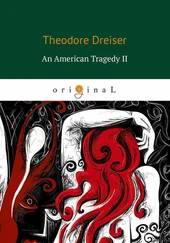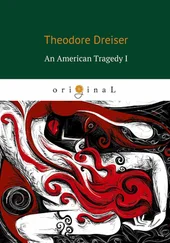Theodore Dreiser - An American Tragedy
Здесь есть возможность читать онлайн «Theodore Dreiser - An American Tragedy» — ознакомительный отрывок электронной книги совершенно бесплатно, а после прочтения отрывка купить полную версию. В некоторых случаях можно слушать аудио, скачать через торрент в формате fb2 и присутствует краткое содержание. Жанр: unrecognised, на английском языке. Описание произведения, (предисловие) а так же отзывы посетителей доступны на портале библиотеки ЛибКат.
- Название:An American Tragedy
- Автор:
- Жанр:
- Год:неизвестен
- ISBN:нет данных
- Рейтинг книги:5 / 5. Голосов: 1
-
Избранное:Добавить в избранное
- Отзывы:
-
Ваша оценка:
- 100
- 1
- 2
- 3
- 4
- 5
An American Tragedy: краткое содержание, описание и аннотация
Предлагаем к чтению аннотацию, описание, краткое содержание или предисловие (зависит от того, что написал сам автор книги «An American Tragedy»). Если вы не нашли необходимую информацию о книге — напишите в комментариях, мы постараемся отыскать её.
An American Tragedy — читать онлайн ознакомительный отрывок
Ниже представлен текст книги, разбитый по страницам. Система сохранения места последней прочитанной страницы, позволяет с удобством читать онлайн бесплатно книгу «An American Tragedy», без необходимости каждый раз заново искать на чём Вы остановились. Поставьте закладку, и сможете в любой момент перейти на страницу, на которой закончили чтение.
Интервал:
Закладка:
How often had Clyde and his sisters and younger brother seen his mother or father, or both, in conference with some derelict or semi-repentant soul who had come for advice or aid, most usually for aid. And here at times, when his mother's and father's financial difficulties were greatest, they were to be found thinking, or as Asa Griffiths was wont helplessly to say at times, "praying their way out," a rather ineffectual way, as Clyde began to think later.
And the whole neighborhood was so dreary and run-down that he hated the thought of living in it, let alone being part of a work that required constant appeals for aid, as well as constant prayer and thanksgiving to sustain it.
Mrs. Elvira Griffiths before she had married Asa had been nothing but an ignorant farm girl, brought up without much thought of religion of any kind. But having fallen in love with him, she had become inoculated with the virus of Evangelism and proselytizing which dominated him, and had followed him gladly and enthusiastically in all of his ventures and through all of his vagaries. Being rather flattered by the knowledge that she could speak and sing, her ability to sway and persuade and control people with the "word of God," as she saw it, she had become more or less pleased with herself on this account and so persuaded to continue.
Occasionally a small band of people followed the preachers to their mission, or learning of its existence through their street work, appeared there later—those odd and mentally disturbed or distrait souls who are to be found in every place. And it had been Clyde's compulsory duty throughout the years when he could not act for himself to be in attendance at these various meetings. And always he had been more irritated than favorably influenced by the types of men and women who came here—mostly men—down-and-out laborers, loafers, drunkards, wastrels, the botched and helpless who seemed to drift in, because they had no other place to go. And they were always testifying as to how God or Christ or Divine Grace had rescued them from this or that predicament—never how they had rescued any one else. And always his father and mother were saying "Amen" and "Glory to God," and singing hymns and afterward taking up a collection for the legitimate expenses of the hall— collections which, as he surmised, were little enough—barely enough to keep the various missions they had conducted in existence.
The one thing that really interested him in connection with his parents was the existence somewhere in the east—in a small city called Lycurgus, near Utica he understood—of an uncle, a brother of his father's, who was plainly different from all this. That uncle—Samuel Griffiths by name—was rich. In one way and another, from casual remarks dropped by his parents, Clyde had heard references to certain things this particular uncle might do for a person, if he but would; references to the fact that he was a shrewd, hard business man; that he had a great house and a large factory in Lycurgus for the manufacture of collars and shirts, which employed not less than three hundred people; that he had a son who must be about Clyde's age, and several daughters, two at least, all of whom must be, as Clyde imagined, living in luxury in Lycurgus. News of all this had apparently been brought west in some way by people who knew Asa and his father and brother. As Clyde pictured this uncle, he must be a kind of Croesus, living in ease and luxury there in the east, while here in the west—Kansas City—he and his parents and his brother and sisters were living in the same wretched and hum-drum, hand-to-mouth state that had always characterized their lives.
But for this—apart from anything he might do for himself, as he early began to see—there was no remedy. For at fifteen, and even a little earlier, Clyde began to understand that his education, as well as his sisters' and brother's, had been sadly neglected. And it would be rather hard for him to overcome this handicap, seeing that other boys and girls with more money and better homes were being trained for special kinds of work. How was one to get a start under such circumstances? Already when, at the age of thirteen, fourteen and fifteen, he began looking in the papers, which, being too worldly, had never been admitted to his home, he found that mostly skilled help was wanted, or boys to learn trades in which at the moment he was not very much interested. For true to the standard of the American youth, or the general American attitude toward life, he felt himself above the type of labor which was purely manual. What! Run a machine, lay bricks, learn to be a carpenter, or a plasterer, or plumber, when boys no better than himself were clerks and druggists' assistants and bookkeepers and assistants in banks and real estate offices and such! Wasn't it menial, as miserable as the life he had thus far been leading, to wear old clothes and get up so early in the morning and do all the commonplace things such people had to do?
For Clyde was as vain and proud as he was poor. He was one of those interesting individuals who looked upon himself as a thing apart—never quite wholly and indissolubly merged with the family of which he was a member, and never with any profound obligations to those who had been responsible for his coming into the world. On the contrary, he was inclined to study his parents, not too sharply or bitterly, but with a very fair grasp of their qualities and capabilities. And yet, with so much judgment in that direction, he was never quite able—at least not until he had reached his sixteenth year—to formulate any policy in regard to himself, and then only in a rather fumbling and tentative way.
Incidentally by that time the sex lure or appeal had begun to manifest itself and he was already intensely interested and troubled by the beauty of the opposite sex, its attractions for him and his attraction for it. And, naturally and coincidentally, the matter of his clothes and his physical appearance had begun to trouble him not a little—how he looked and how other boys looked. It was painful to him now to think that his clothes were not right; that he was not as handsome as he might be, not as interesting. What a wretched thing it was to be born poor and not to have any one to do anything for you and not to be able to do so very much for yourself!
Casual examination of himself in mirrors whenever he found them tended rather to assure him that he was not so bad-looking—a straight, well-cut nose, high white forehead, wavy, glossy, black hair, eyes that were black and rather melancholy at times. And yet the fact that his family was the unhappy thing that it was, that he had never had any real friends, and could not have any, as he saw it, because of the work and connection of his parents, was now tending more and more to induce a kind of mental depression or melancholia which promised not so well for his future. It served to make him rebellious and hence lethargic at times. Because of his parents, and in spite of his looks, which were really agreeable and more appealing than most, he was inclined to misinterpret the interested looks which were cast at him occasionally by young girls in very different walks of life from him—the contemptuous and yet rather inviting way in which they looked to see if he were interested or disinterested, brave or cowardly.
And yet, before he had ever earned any money at all, he had always told himself that if only he had a better collar, a nicer shirt, finer shoes, a good suit, a swell overcoat like some boys had! Oh, the fine clothes, the handsome homes, the watches, rings, pins that some boys sported; the dandies many youths of his years already were! Some parents of boys of his years actually gave them cars of their own to ride in. They were to be seen upon the principal streets of Kansas City flitting to and fro like flies. And pretty girls with them. And he had nothing. And he never had had.
Читать дальшеИнтервал:
Закладка:
Похожие книги на «An American Tragedy»
Представляем Вашему вниманию похожие книги на «An American Tragedy» списком для выбора. Мы отобрали схожую по названию и смыслу литературу в надежде предоставить читателям больше вариантов отыскать новые, интересные, ещё непрочитанные произведения.
Обсуждение, отзывы о книге «An American Tragedy» и просто собственные мнения читателей. Оставьте ваши комментарии, напишите, что Вы думаете о произведении, его смысле или главных героях. Укажите что конкретно понравилось, а что нет, и почему Вы так считаете.










